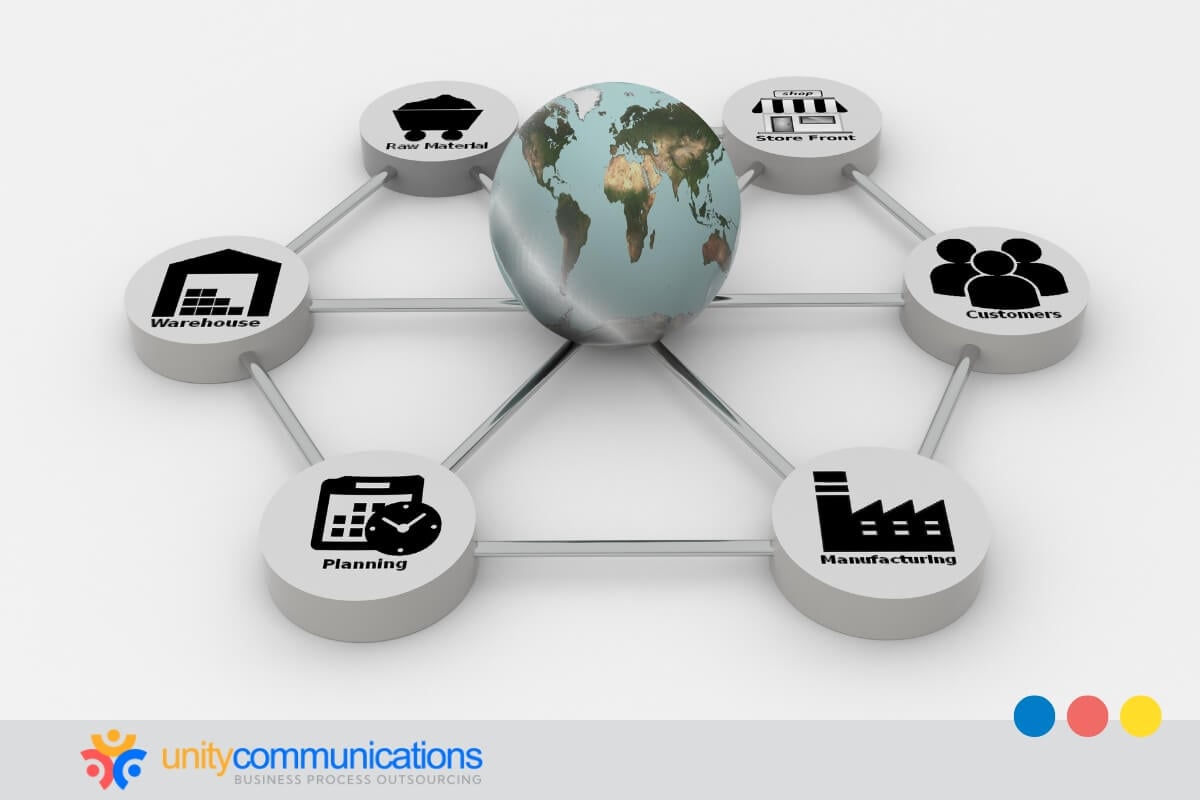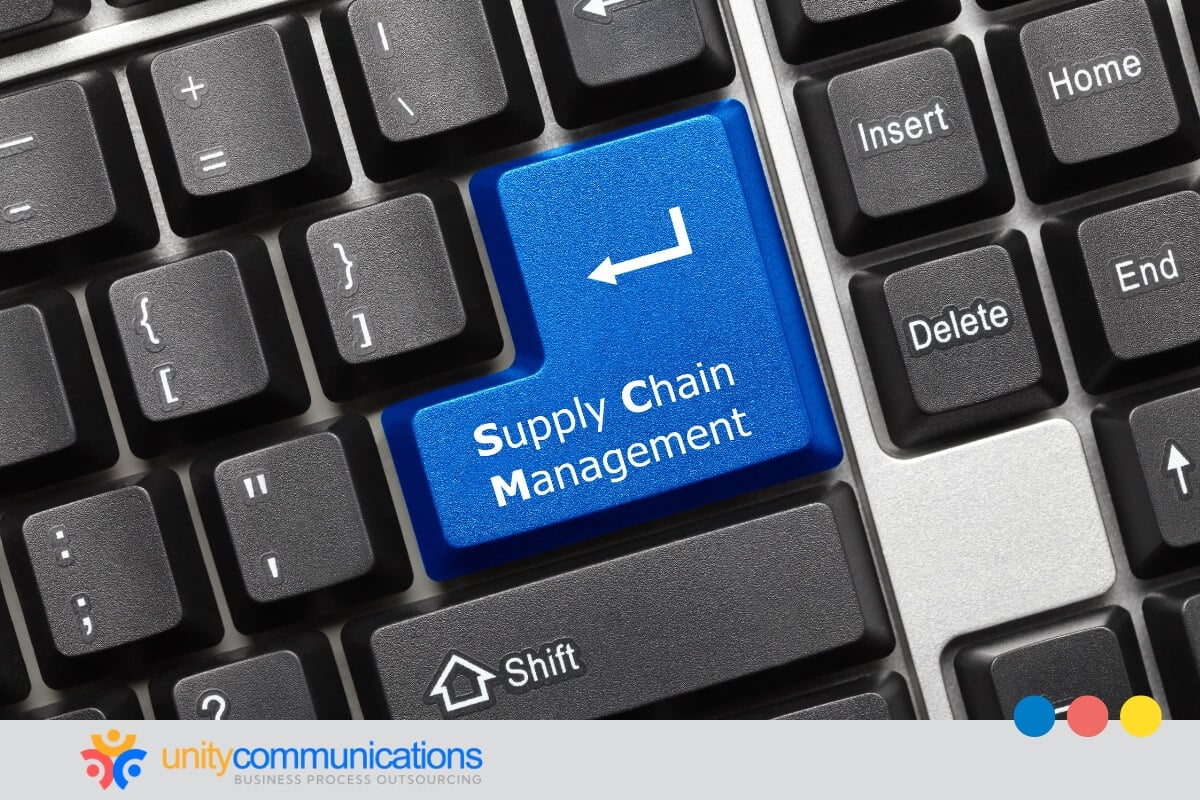Table of Contents
Efficiency and accuracy are critical to smooth supply chain operations. Uninterrupted logistics and inventory management require seamless data and resource distribution. Hence, any errors result in delayed shipments, excessive backlogs, and high mitigation costs.
Fortunately, business process outsourcing (BPO) streamlines such processes. But does your business need a third-party team? How do service providers contribute to this matter?
Read this article to understand BPO’s position in supply chain analytics.
Why Companies Need BPO for Supply Chain Analytics

Logistics companies need third-party support to enhance their supply chain analytics at affordable costs. BPO providers offer access to skilled professionals and advanced technologies at hourly or monthly fees. They use these resources to help address the following challenges in supply chain analytics:
- Ensuring the quality and accuracy of data from various supply chain sources
- Processing big data on logistics and inventory management promptly
- Facilitating real-time visibility for quick issue resolutions and agile decision-making
- Achieving high predictive precision for supply chain management processes
- Developing predictive service models and customized reports for actionable insights
- Achieving scalability and flexibility for improved logistics operations
BPO in Supply Chain Analytics: Key Contributions

Grand View Research’s latest statistics show that the global supply chain analytics market reached $6.12 billion in 2022. According to the report, small businesses continuously increase their expenditure on supply chain analytics. They rely on this function to inform and improve tech adoption and enterprise resource management decision-making.
Due to a limited workforce and budget, small enterprises hire BPO companies. They gain access to more available resources when outsourcing, as 16% of polled small enterprises confirmed in UpCity’s 2022 study. Of the 600 respondents, 7% said BPO services are more affordable than in-house recruitment.
But how do BPO providers assist these businesses and larger companies in streamlining supply chain analytics? Let us discuss BPO’s vital contributions in this domain.
Leverage Modern Technologies
Service providers optimize cutting-edge technologies to help boost supply chain analytics tasks. They invest in artificial intelligence (AI) and machine learning (ML) tools, such as Hadoop and Spark, to process real-time logistics data.
Moreover, BPO companies optimize AI/ML algorithms to identify the most effective inventory levels, transportation modes, and routes. This way, client organizations avoid high error costs and reduce lead times in their supply chain operations.
Third-party vendors also use other advanced solutions to improve supply chain analytics processes. Depending on a company’s needs and budget, they give access to these platforms as part of a contract or subscription:
- Internet of Things (IoT) devices and sensors
- Predictive analytics software
- Blockchain technology
- Advanced data visualization systems
- Supply chain management software
- Robotic process automation (RPA) and cloud computing tools
- Natural language processing (NLP) solutions
Accelerate Data Collection
What is BPO’s role in streamlining logistics and inventory management? Primarily, service providers accelerate data collection by combining a large talent pool with analytics technologies to gather and deliver real-time insights. Such information supports clients’ agile decision-making in the supply chain.
Third-party teams also use automated data capture solutions to easily collect critical information from products, shipments, and customer service processes. These systems include barcode scanners, radio-frequency identification (RFID) tools, IoT sensors, and cloud data management platforms.
Furthermore, support vendors integrate the application programming interface (API) with logistics clients, suppliers, and other relevant stakeholders. APIs allow them to seamlessly and remotely exchange data between multiple systems, boosting daily operations.
Advance Operations Planning
As BPO assists in fast-tracking supply chain analytics and data collection, businesses can advance their operations planning. Third-party providers help them compile and understand historical data and industry shifts. The resulting insights guide them in forecasting customer demand patterns and adjusting product inventory processes.
For instance, AI and BPO analytics tools help clients study factors that impact their supply chain functions, such as lead times and service targets. Knowing these aspects enables them to determine and plan optimal inventory levels. It also prevents overstocking or stockouts.
Vendors also deliver custom analytics dashboards to ensure a more effective logistics and inventory management strategy. These platforms provide real-time insights into key performance indicators (KPIs), such as order fulfillment rates, inventory turnovers, and delivery costs. They facilitate data-driven decision-making for supply chain process improvements.
Monitor Issues and Trends
BPO firms utilize advanced analytics and predictive modeling techniques to monitor supply chain issues and trends. This action helps identify seasonal fluctuations and operational challenges. The gathered insights inform efforts to advance logistics operations and optimize inventory levels.
In addition, service providers perform root cause analysis to pinpoint the underlying reasons for supply chain problems. With expertise and advanced tech, support vendors assist clients in resolving core issues. They also implement necessary measures, such as automated alert systems, to prevent future occurrences.
Perform Simulation and Scenario Analysis
Service vendors implement simulation and scenario analysis to aid businesses in modeling and evaluating the effectiveness of their logistics and inventory management strategies. This valuable approach helps clients anticipate potential challenges and make informed enterprise decisions.
Aside from data collection and framework development, BPO companies execute the following procedures for simulation and scenario analysis:
- Specify scenarios that require assessment, such as supplier behavioral changes.
- Establish KPIs to evaluate each scenario’s effectiveness.
- Parameterize business models with relevant data, including variables and constraints.
- Test virtual supply chain scenarios using simulation software.
- Analyze simulation results to understand how every scenario impacts the supply chain.
- Compare KPIs across scenarios to lay out strengths, weaknesses, and tradeoffs.
- Assess potential risks related to each scenario.
- Prepare graphical reports and presentations of research findings.
- Recommend and execute cost-efficient methods to enhance logistics operations.
- Continuously monitor and update supply chain strategies based on market trends.
The Bottom Line

BPO providers leverage robust supply chain analytics technologies to improve logistics and inventory management. They maximize workforce expertise and modern tech to automate data collection and boost operations planning.
Providers ensure the resulting insights support your decision-making and strategy development for more cost-effective supply chain processes, from monitoring issues to simulating scenarios. As long as you pick the best BPO partner, you can expect the benefits of outsourcing supply chain analytics.
Let’s connect and discuss how our scalable team at Unity Communications can fulfill your logistics support needs. The award-winning provider has flexible experts and modern solutions to help meet your daily supply chain requirements.




